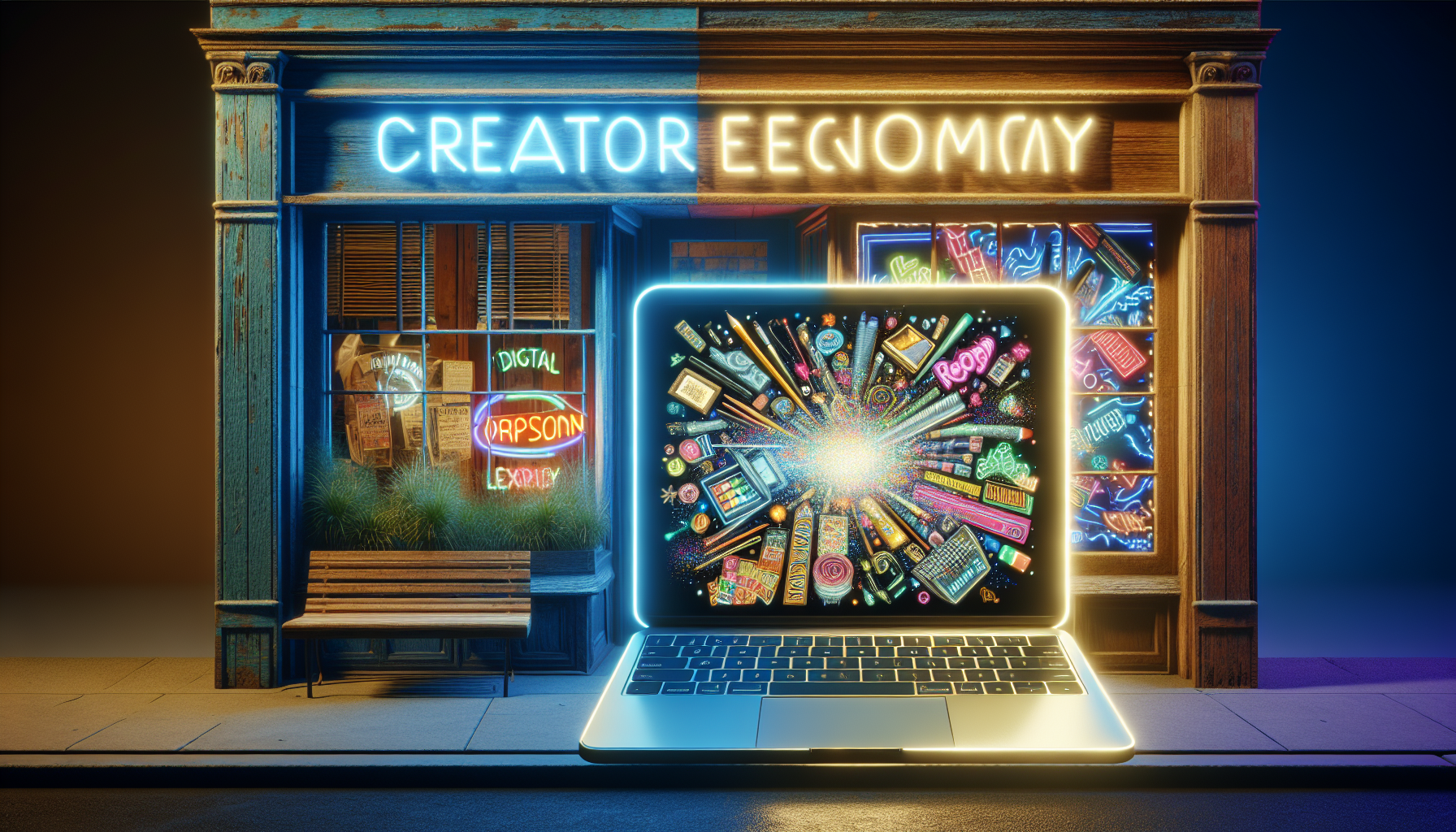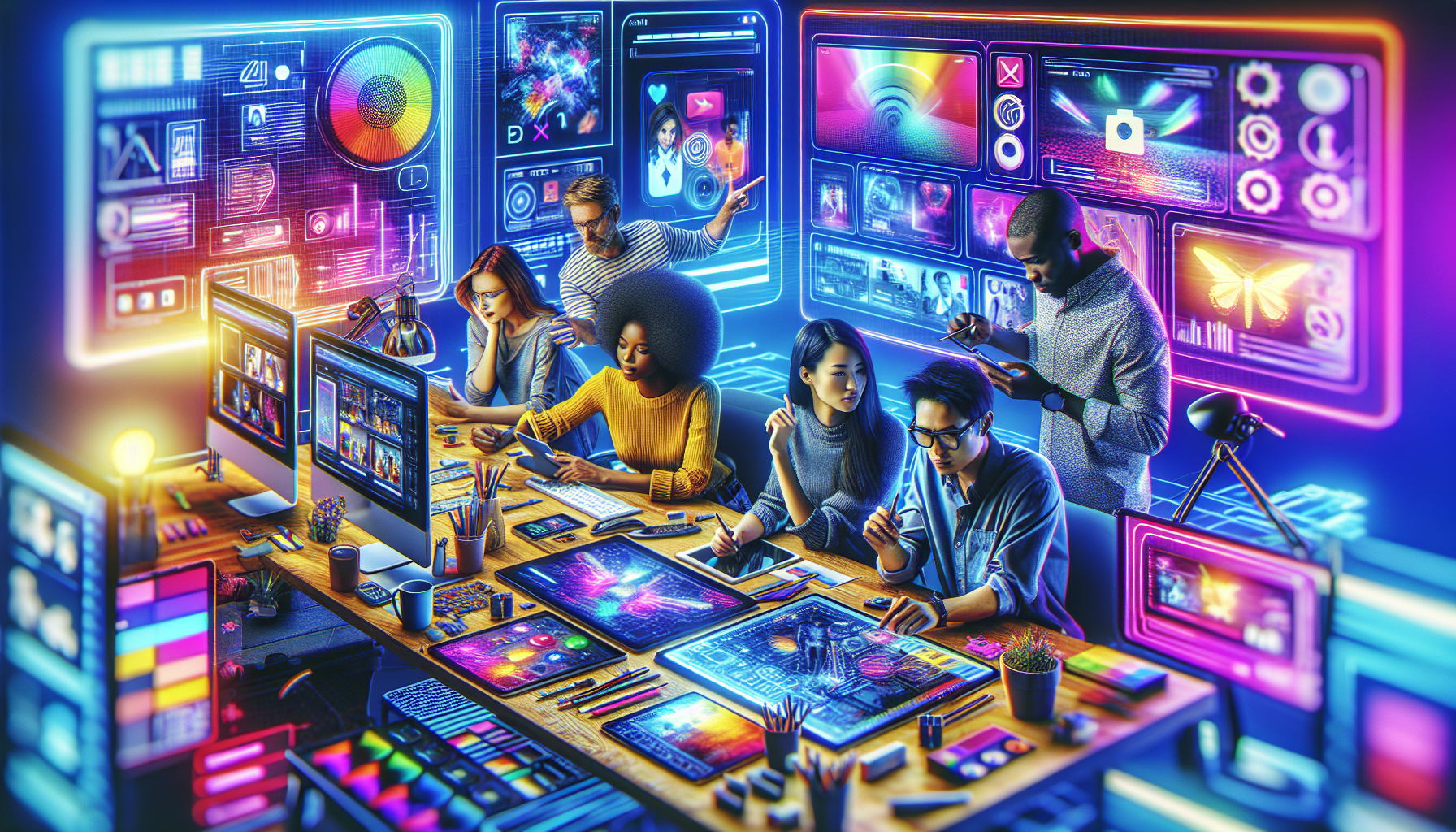
 The creator economy is transforming the landscape of work, business, and culture as individuals leverage digital platforms to build unique brands and generate income. This new wave empowers creators to monetize their passions through innovative means, reshaping how traditional businesses operate.
The creator economy is transforming the landscape of work, business, and culture as individuals leverage digital platforms to build unique brands and generate income. This new wave empowers creators to monetize their passions through innovative means, reshaping how traditional businesses operate.
Empowering Individual Creators
The rise of the creator economy provides a platform for individuals to turn their talents into thriving businesses. Platforms like YouTube, Instagram, and TikTok allow creators to reach global audiences with minimal barriers to entry. Influencers generate income through ad revenue, sponsored content, and direct fan engagement—creating multi-stream income models.
Monetization Strategies
– Patreon and Substack: Creators offer exclusive content for subscribers who pay a monthly fee, providing a consistent revenue stream. This model empowers creators to share specialized knowledge or niche content without relying entirely on advertising.
– Merchandising: Many creators capitalize on their brand by selling merchandise, turning fans into loyal customers. This strategy cultivates a sense of community while boosting income.
– Branded Partnerships: Businesses are eager to collaborate with influencers who align with their brand values. These partnerships generate significant income for creators while offering companies authentic outreach to potential customers.
Tooling and Platforms Shaping the Economy
With the introduction of platforms like TikTok and Instagram Reels, short-form content has become a powerful tool for engagement and growth. Services like Shopify and Spreadshirt facilitate e-commerce solutions for creators, streamlining the merchandising process.
Effects on Traditional Businesses
As the creator economy flourishes, traditional businesses face challenges adapting to this new digital world. Companies that embrace influencer marketing and integrate creator collaborations into their strategies often see enhanced consumer engagement and brand loyalty.
Broad Impact on Digital Culture
The cultural impact of creators is undeniable, as personalities have grown into influential figures shaping entertainment trends and discourse. This shift in media consumption highlights the personal connection audiences seek, driving demand for authentic content.
In conclusion, the rise of the creator economy represents a pivotal shift in how work, business, and media function. By harnessing digital platforms, individuals not only gain independence but also influence traditional business practices, demanding innovation and adaptability across industries.
Impact on marketing strategies
The shift towards a creator-driven landscape is dramatically altering marketing strategies, compelling traditional businesses to rethink their approaches. In an era dominated by social media icons and digital influencers, connecting with audiences has taken on a personal touch. Trust and authenticity are now central to effective marketing, favored over blanket advertising techniques of the past.
A Personal Connection
Brands increasingly recognize the power authentic influencer partnerships hold. Collaborating with creators enables businesses to tap into established communities where trust has already been cultivated. For instance, Daniel Wellington, a watch brand, adeptly employed micro-influencers on Instagram to showcase their product, achieving impressive levels of engagement and brand visibility.
Diverse Revenue Channels
Creators aren’t just presenting products; they’re crafting experiences and narratives. This interactive nature translates into innovative marketing strategies such as live shopping events on platforms like Instagram and TikTok. By leveraging these opportunities, businesses drive real-time consumer interactions and instant purchasing decisions, providing a vibrant alternative to traditional advertising.
Data-Driven Insights
Utilizing analytics tools available on social platforms, businesses can understand audience preferences more precisely than ever before. This data-driven approach allows for tailored marketing campaigns that resonate with specific demographics. Brands can now effectively track engagement, refining their strategies based on immediate feedback and performance metrics.
Crowdsourcing and Collaboration
Marketing strategies have also witnessed a crowd-sourced revolution. By involving creators in product ideation and development phases, businesses can access a pool of authentic consumer insights. This approach enhances product relevance, ensuring alignment with current trends and consumer needs. Mountain Dew, for example, leveraged a creator community to help develop new flavors, directly engaging their fan base.
Evolving Content Formats
As digital environments evolve, so too do content formats. Traditional businesses adopting formats popularized by creators—such as behind-the-scenes content, raw vlogs, and user-generated content contests—find themselves better positioned to maintain relevancy. Engaging storytelling formats allow consumers to connect on a personal level, fostering brand loyalty and community.
This melding of influencer insight and brand strategy is redefining marketing landscapes. Traditional businesses maneuvering through this bustling creator economy are innovating around these changes, embracing co-creation and community-focused models. Balancing new approaches with conventional strategies, they adeptly navigate a world shaped by digital creativity.
Shifts in consumer behavior
The creator economy is profoundly altering consumer behavior, reshaping how audiences discover, evaluate, and purchase products and services. With the rise of digital platforms, consumers are more empowered and informed, leading to shifts in purchasing patterns and brand interactions.
Consumer Empowerment through Accessibility
– Direct Engagement: Consumers now have direct access to creators who influence their purchasing decisions. Platforms like Instagram and TikTok allow for immediate interaction, enabling followers to directly ask questions and participate in live sessions. This engagement often results in a deeper personal connection to both the creator and the products they endorse.
– Informed Decisions: With creators often sharing detailed product reviews and testimonials, consumers are more informed than ever. This shift has largely reduced reliance on traditional advertisements, as buyers prefer authentic recommendations from creators they trust.
Preference for Authenticity
– Trust over Ads: Consumers are increasingly skeptical of traditional marketing, favoring authentic content from creators. For example, when a beauty creator demonstrates a makeup tutorial featuring sponsored products, the content appears more genuine than a conventional commercial. This development underscores the need for brands to leverage creators’ credibility to reach potential customers effectively.
– Community Influence: With online communities forming around creators, many followers feel a sense of belonging and camaraderie. This community-driven environment influences consumer decisions, as peer recommendations within these groups further reinforce product trustworthiness.
The Role of Micro-Influencers
– Niche Markets: Micro-influencers, with their smaller but highly engaged audiences, have emerged as key players. They often cater to niche markets, providing targeted recommendations that resonate deeply within their communities. This precision enables traditional businesses to reach segmented audiences effectively, fostering strong connections.
– Higher Engagement Rates: Despite having fewer followers than major influencers, micro-influencers tend to generate higher engagement rates, making them valuable partners for businesses seeking to boost authenticity and reach.
Overall, the creator economy is catalyzing a significant shift in consumer behavior, compelling traditional businesses to adapt. By connecting more personally and authentically with audiences through creators, businesses can stay relevant in this new digital landscape. As consumers’ reliance on trusted digital voices continues to grow, embracing these changes is essential for sustaining success.
Challenges for traditional businesses
The rapid growth of the creator economy is presenting unique challenges for traditional businesses striving to remain competitive in this dynamic landscape. As individual creators leverage digital platforms to build personal brands and monetize their content, established companies find themselves needing to adapt to these shifts or risk being left behind.
Disruption of Traditional Models
Traditional advertising models are becoming less effective as audiences gravitate towards personalized and authentic content created by influencers. The decline in television viewership and print media circulation illustrates the impact, prompting businesses to reconsider their marketing investments. The visibility and appeal creators command on platforms like Instagram and YouTube eclipse many conventional advertising efforts, forcing businesses to adopt more content-driven strategies.
The Battle for Consumer Attention
The attention economy is reshaping consumer behavior, with individuals increasingly engaged in interactive and community-driven content. Brands now struggle to capture the same level of interest as creators who offer engaging narratives and genuine interactions. The competition for screen time is intense, requiring traditional businesses to diversify their digital presence and explore collaborations with influencers to stay relevant.
Adapting to Technological Advances
The tools and platforms powering the creator economy are continuously evolving, making it challenging for traditional businesses to keep pace. New features and algorithm updates on platforms like TikTok and Instagram Reels demand constant adaptation and innovation. Businesses must allocate resources to understanding these technologies and integrating them into their strategies to effectively reach younger, tech-savvy audiences.
Emerging Business Models
As creators monetize through diverse channels such as Patreon, Substack, and brand collaborations, traditional businesses are compelled to rethink their revenue models. Subscriptions, exclusivity, and experiential offerings are just a few ways creators generate income beyond conventional avenues. Companies need to explore hybrid models that incorporate elements of the creator economy, ensuring they align with consumer expectations for value and engagement.
Navigating Intellectual Property and Content Ownership
The proliferation of user-generated content raises concerns over intellectual property rights and content ownership. Traditional businesses must navigate legal complexities associated with using creator content, necessitating clear agreements and partnerships that protect both parties’ interests. This calls for a comprehensive understanding of digital rights and the development of contracts that accommodate the fast-paced nature of online collaboration.
Ultimately, the effects of the creator economy are reshaping the landscape for traditional businesses, urging them to rethink their strategies and embrace change. By acknowledging these challenges and leveraging the strengths of creators, companies can forge new paths to success in the ever-evolving digital arena.
Opportunities for collaboration
As the creator economy continues to flourish, traditional businesses face transformative opportunities to collaborate with creative individuals in this digital age. Rather than viewing creators as competitors, forward-thinking companies can leverage these partnerships to enhance brand visibility and reach new audiences through genuine interactions.
Creative Collaborations
Traditional businesses can tap into the ingenuity of creators by partnering on unique projects. Collaborations might range from content co-creation to launching exclusive product lines. For instance, Nike has effectively worked with various influencers to promote limited edition sneakers, driving engagement and sales. These partnerships allow companies to immerse their brands within distinct communities while benefiting from creators’ loyal followings.
Bridging the Gap with Co-Branding
Co-branding initiatives present a strategic opportunity for businesses to marry traditional strength with the novel appeal of creators. Beauty brand Morphe partnered with popular YouTube personality James Charles to launch a line of makeup products, resulting in a surge of brand interest and sales. Such collaborations blend the creative insights of influencers with business acumen, offering consumers fresh experiences and reinforcing brand identity.
Online Events and Experiences
The rise of virtual events offers fertile ground for collaboration. Companies can engage audiences by hosting digital experiences alongside creators. Whether it’s a live-streamed product launch or an interactive workshop, these events can reach extensive audiences eager for novel content. By collaborating with creators to host these events, businesses can enhance their brand’s relatability and foster community engagement.
Product Development and Feedback
Engaging creators in the product development process allows businesses to align with trending consumer interests. Brands can source feedback directly from creators’ audiences, thus refining their offerings. Mountain Dew successfully utilized this approach by involving fans and creators in their flavor development process, ensuring new products align with customer preferences.
Enhanced Marketing Strategies
Integrating creators into marketing strategies amplifies branding efforts through authentic storytelling. When creators share experiences centered around a brand, it resonates deeply with audiences, often more so than traditional ads. Companies like Spotify harness creator playlists and collaborations to build an authentic connection with users, showcasing how embracing the creator economy can transform marketing paradigms.
In embracing these collaboration opportunities, traditional businesses can effectively navigate the shifting digital landscape. The impact of these partnerships is far-reaching, driving consumer engagement, brand innovation, and long-term growth. Embracing the dynamics of the creator economy positions businesses to thrive amidst evolving consumer expectations, leveraging creativity to forge enduring industry success.

